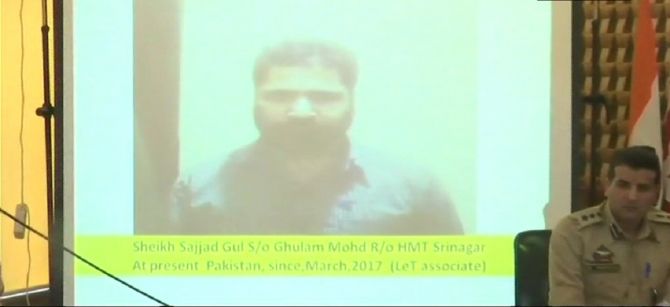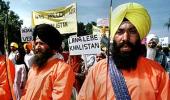Terror group Lashkar-e-Tayiba's member Sheikh Sajad alias Sajjad Gul, who took part in the conspiracy to kill journalist Shujaat Bukhari in Srinagar in 2018, was designated as a terrorist by the Centre on Tuesday.

Gul is the sixth individual to have been designated as a terrorist by the Centre in the last fortnight.
The Union home ministry said Gul is absconding in a case pertaining to recovery of arms and ammunition in Jammu and Kashmir and has been actively radicalising, motivating and recruiting youngsters in the
Union Territory to support the LeT. He has also been involved in terror funding, the ministry said.
Gul was found involved in hatching a criminal conspiracy, in connivance with other members of the LeT, to eliminate Bukhari, a prominent journalist, along with two of his personal security officers, at the busy Press Enclave area of Srinagar on June 14, 2018, the ministry said in a notification.
Considering his terror activities, the home ministry designated Gul as a terrorist under the Unlawful Activities (Prevention) Act, 1967 (37 of 1967).
Born on October 10, 1974, Gul hails from the Rose Avenue Colony HMT Shalteng in Srinagar, and is one of the commanders of the LeT.
He is the 37th individual to have been declared as a designated terrorist by the Centre.
"Now, therefore, in exercise of the powers conferred by clause (a) of sub-section (1) of section 35 of the Unlawful Activities (Prevention) Act, 1967, the central government hereby makes the following amendment in the Fourth Schedule to the said Act, namely:- In the Fourth Schedule to the said Act, after serial number 36 and entries relating thereto, the following serial number and entries shall be inserted, namely:— '37. Sheikh Sajad @Sheikh Sajjad Gul @Sajjad Gul @Sajjad Ah Sheikh'," the notification read.
With the declaration of Gul as a terrorist, the law-enforcement agencies can now attach his properties, besides booking any person associated with him.
On April 8, the government had designated Hafiz Talha Saeed, a key leader of the LeT and the son of 26/11 Mumbai terror attacks mastermind Hafiz Saeed, as a terrorist.
Three days later, on April 11, Pakistani national Mohiuddin Aurangzeb Alamgir, who was involved in a terror attack on a Central Reserve Police Force bus in Jammu and Kashmir's Pulwama in 2019, was designated as a terrorist.
On April 12, Ali Kashif Jan, the Pakistani handler of the terrorists involved in the 2016 attack on the Pathankot airbase, was designated as a terrorist by the Centre.
On April 13, Mushtaq Ahmed Zargar, who was involved in a series of terror attacks in Jammu and Kashmir and was one of the terrorists released by India in exchange for hostages in the hijacking of Indian Airlines flight IC-814 in 1999, was declared as a designated terrorist.
On April 18, Ashiq Ahmed Nengroo, a commander of banned outfit Jaish-e-Mohammad, was designated as a terrorist.
The LeT has been responsible for a series of deadly attacks in India, mostly in Jammu and Kashmir, in which scores of civilians and security personnel have been killed over the years.
LeT founder Hafiz Saeed and the group's "operational commander", Zakiur Rehman Lakhvi, besides JeM founder Maulana Masood Azhar, who was also released by the government in exchange for the passengers of Indian Airlines flight IC-814 from Afghanistan's Kandahar, are some of the most wanted terrorists in India.
India has been consistently seeking the custody of all three, but Pakistan has refused to comply.
The LeT and the JeM are listed as terrorist organisations under the First Schedule of the UAPA.
The UAPA has been enacted to provide for more effective prevention of certain unlawful activities of associations and individuals, dealing with terrorist activities and matters connected therewith.
The Act empowers the Centre to notify the name of an individual in its Fourth Schedule if it believes that he is involved in terrorism.











 © 2025
© 2025